William Rudolf O'Donovan
William Rudolf O'Donovan (March 28, 1844 – April 20, 1920[2]) was an American sculptor.
William Rudolf O'Donovan | |
|---|---|
 William Rudolf O'Donovan and his bust of Walt Whitman (May 1891). Photograph by Thomas Eakins.[1] | |
| Born | March 28, 1844 |
| Died | April 20, 1920 (aged 76) |
| Known for | Sculpture |
Biography
O'Donovan was born in Preston County, Virginia (now West Virginia), and taught himself to sculpt. After the Civil War, in which O'Donovan served in the Confederate army, he opened a studio in New York City and became well known as a sculptor, especially of memorial pieces.[3]
In 1878, O'Donovan become an associate of the National Academy of Design.[3] George Washington was a favorite subject of his, and he published a series of papers on Washington portraits.[4] During the 1870s and 1880s he collaborated with Maurice J. Power, politician, sculptor and owner of the National Fine Art Foundry producing many works of public art.[5]
Selected works
- Relief portrait of Bayard Taylor (c. 1870), Beinecke Library, Yale University, New Haven, Connecticut.[6]
- Portrait of Winslow Homer (c. 1878), bronze. Corcoran Gallery of Art, Washington, D.C.[7]
- John Paulding (1880), Captors' Monument, Patriot's Park, Tarrytown, New York.[8]
- Cavalry Officer; Sailor (1880–81), Soldiers' and Sailors' Monument, Lawrence, Massachusetts.[9]
- Bas-relief panels of Herkimer Directing the Oriskany Battle and Combat (1882–84), Oriskany Battlefield Monument, Oriskany, New York.[10]
- George Washington (1883), Plaza Washington, El Paraiso, Caracas, Venezuela.[11][12]
- Marie Heimlicher (1884), bronze. Smithsonian Institution. Hirshhorn Museum and Sculpture Garden.[13]
- Colonel Daniel Morgan (1885–86), Saratoga Battle Monument, Saratoga National Historical Park, Victory Mills, New York.[14][15]
- Tower of Victory, Washington's Headquarters State Historic Site, Newburgh, New York.[16][17]
- George Washington (1886–87).
- Architectural sculptures of Rifleman; Artilleryman; Light Dragoon; and Infantry Line Officer (1888).
- Irish Brigade Monument (1888), Gettysburg Battlefield, Gettysburg, Pennsylvania. A granite Celtic Cross guarded by a life-size bronze statue of an Irish wolfhound.[18]
- Bust of Walt Whitman (1891), unlocated.[19]
- Archbishop Hughes (1891), Fordham University, Fordham, New York.[20]
- Trenton Battle Monument, Trenton, New Jersey.[21][22]
- Colossal Statue of George Washington (1891–93).
- Private John Russell and Private Blair McClenachan (1891–93), two statues of 14th Regiment Massachusetts soldiers flanking the monument's entrance.[23]
- Thomas Eakins modeled two bas-relief panels for the monument's base; Charles Henry Niehaus modeled the third panel.
- Bust of Thomas Eakins (1892), bronze; unlocated. Exhibited at the Columbian Exposition, 1893, item #154.[24][25]
- Bas-relief panels of President Lincoln and General Grant (1893–94), Soldiers' and Sailors' Arch, Grand Army Plaza, Brooklyn, New York.[26][27] O'Donovan modeled the men; Thomas Eakins modeled the horses.
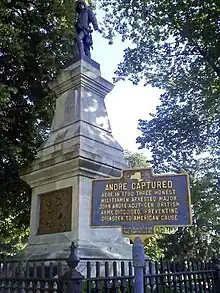 John Paulding (1880), atop the Captors' Monument, Patriot's Park, Tarrytown, New York.
John Paulding (1880), atop the Captors' Monument, Patriot's Park, Tarrytown, New York. Cavalry Officer (1880–81), Soldiers' and Sailors' Monument, Lawrence, Massachusetts.
Cavalry Officer (1880–81), Soldiers' and Sailors' Monument, Lawrence, Massachusetts. Sailor (1880–81), Soldiers' and Sailors' Monument, Lawrence, Massachusetts.
Sailor (1880–81), Soldiers' and Sailors' Monument, Lawrence, Massachusetts. Herkimer Directing the Oriskany Battle (1882–84), Oriskany Battle Monument, Oriskany, New York.
Herkimer Directing the Oriskany Battle (1882–84), Oriskany Battle Monument, Oriskany, New York. Combat (1882–84), Oriskany Battle Monument, Oriskany, New York.
Combat (1882–84), Oriskany Battle Monument, Oriskany, New York.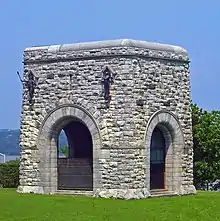 Tower of Victory (1886–88), Washington's Headquarters State Historic Site, Newburgh, New York.
Tower of Victory (1886–88), Washington's Headquarters State Historic Site, Newburgh, New York.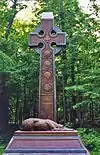 Irish Brigade Monument (1888), Gettysburg Battlefield, Gettysburg, Pennsylvania.
Irish Brigade Monument (1888), Gettysburg Battlefield, Gettysburg, Pennsylvania.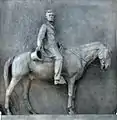 President Lincoln (1893–94), Soldiers' and Sailors' Arch, Grand Army Plaza, Brooklyn, New York.
President Lincoln (1893–94), Soldiers' and Sailors' Arch, Grand Army Plaza, Brooklyn, New York.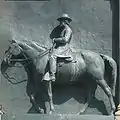 General Grant (1893–94), Soldiers' and Sailors' Arch, Grand Army Plaza, Brooklyn, New York.
General Grant (1893–94), Soldiers' and Sailors' Arch, Grand Army Plaza, Brooklyn, New York.
Notes
- Bust of Walt Whitman
- "O'Donovan, William Rudolf". Dictionary of American Biography. Vol. Comprehensive Index. New York: Charles Scribner's Sons. 1990.
- One or more of the preceding sentences incorporates text from a publication now in the public domain: Chisholm, Hugh, ed. (1911). "O'Donovan, William Rudolf". Encyclopædia Britannica. Vol. 20 (11th ed.). Cambridge University Press. p. 9.
- One or more of the preceding sentences incorporates text from a publication now in the public domain: Wilson, J. G.; Fiske, J., eds. (1900). . Appletons' Cyclopædia of American Biography. New York: D. Appleton.
- Reason, Akila (2010). Thomas Eakins and the Uses of History. Philadelphia: University of Pennsylvania Press. p. 152. ISBN 978-0812241983.
- Taylor relief from SIRIS.
- Portrait of Winslow Homer from SIRIS.
- Captors' Monument from SIRIS.
- Lawrence, MA monument from SIRIS.
- Oriskany Monument from SIRIS.
- Inscription: "El Gobierno y el Pueblo de Venezuela a JORGE WASHINGTON Fundador de la Republica del Norte Erigido en el Centenario del Libertador Simon Bolivar 1883." Source: Frances David Whittemore, George Washington in Sculpture (2005), p. 125.
- Venezuela Washington from Flickr.
- Marie Heimlicher from SIRIS.
- Col. Morgan from SIRIS.
- Col. Morgan from Historic Marker Database.
- Newburgh Washington from SIRIS.
- Newburgh Washington from Flickr.
- Irish Brigade from SIRIS.
- Whitman bust from SIRIS.
- Archbishop Hughes from Fordham University Library.
- Trenton Battle Monument from SIRIS.
- Trenton Washington from Destination Trenton.
- Meredith Bzdak, Public Sculpture in New Jersey: Monuments to Collective Identity (New Brunswick: Rutgers University Press, 1999), pp. 36-37.
- National Museum of American Art; National Portrait Gallery (Smithsonian Institution) (1993). Revisiting the white city: American art at the 1893 World's Fair. Washington, D.C. : Hanover: National Museum of American Art and National Portrait Gallery, Smithsonian Institution ; Distributed by the University Press of New England. p. 371. ISBN 0937311014.
- Bust of Thomas Eakins from SIRIS
- Lincoln relief from SIRIS.
- Grant relief from SIRIS.
References
- Virginia Baird Kelly, William Rudolf O'Donovan and the Business, Politics, and Art of Sculpture (Masters thesis, Syracuse University, 1992).
External links
Wikimedia Commons has media related to William Rudolf O'Donovan.
- The William Rudolf O'Donovan Papers are available for research use at the Historical Society of Pennsylvania.
- William Rudolf O'Donovan, on the Smithsonian American Art Museum website
This article is issued from Wikipedia. The text is licensed under Creative Commons - Attribution - Sharealike. Additional terms may apply for the media files.